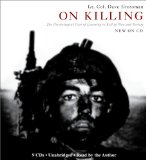On Killing: The Psychological Cost of Learning to Kill in War and Society, Lt. Col. Dave Grossman
|
"Each act of violence eats away at
the fabric of our society like a cancer."
- Lt. Col. Dave Grossman
To say Lieutenant Colonel Dave Grossman's On Killing: The Psychological Cost of Learning to Kill in War and Society is Illuminating is quite an underestimation. This work is so much more, as it reveals the resistance of human beings to kill, and the ability of societies and governments to create killers despite that resistance. It's a necessary revelation into the psychology of death and violence on the battlefield and in civilization.
On Killing focuses on the psychological trauma associated with violence and killing. The author is a psychology professor, former Army Ranger, former paratrooper, and retired U.S Army Lieutenant Colonel. Despite the impressive resume, Grossman has never been in a deadly conflict whether here in civilization or in combat.
In the first two sections, Grossman claims a large percentage of human beings refrain from using deadly violence against another human even when faced with death. Coming from a family with career cops and soldiers most of whom have been in deadly conflicts, I was somewhat dubious about his assertions, at least at first.
He went on to discuss modern conditioning that overcomes the resistance to kill or affords soldiers the ability to compensate via distance (cultural, moral, physical, etc.), mental manipulation, positive reinforcement, or technology. This claim made me think of training tools that I experienced in army boot camp, like the Multiple Integrated Laser Engagement System (MILES) which uses small lasers and blank cartridges, allowing soldiers to shoot at each other during training. (Hits are recorded by activations of the non-lethal laser bullets). We trained with human-shaped targets and repeated chants like "one shot, one kill!" and my platoon's favorite, "What's the spirit of the bayonet? To kill, kill, kill!" Grossman backs up his opinion about the advancements of modern conditioning by comparing the statistics of soldiers from World War II to soldiers who fought in Viet Nam. I found his arguments interesting, perhaps even believable.
Touching upon current societal fascinations with violence in movies, video games, music and entertainment, Grossman contends that this creates a desensitization towards death and violence. By the time I completed listening to the third section, I found myself in agreement with these somewhat outrageous claims. On Killing: The Psychological Cost of Learning to Kill in War and Society is alarming yet informative.
Throughout this audio book, Grossman proves his points with examples from years of research and quotes from combat veterans recounting life-changing battles. They were very detailed in explaining emotions, body language, expressions of the living, the dead, and other things that give readers an in-depth understanding of their experiences and how they were affected. I found this very enlightening.
Grossman concluded with an prediction that America's future will be similar to third world nations, eroded from within by violence, death, and desensitization to both. Personally, I found the book surprisingly compelling and recommend that everyone read it. There may be gaps in his scholarship, but his conclusions and observations deserve additional consideration and study.
John
Robert Taylor
9/22/09

